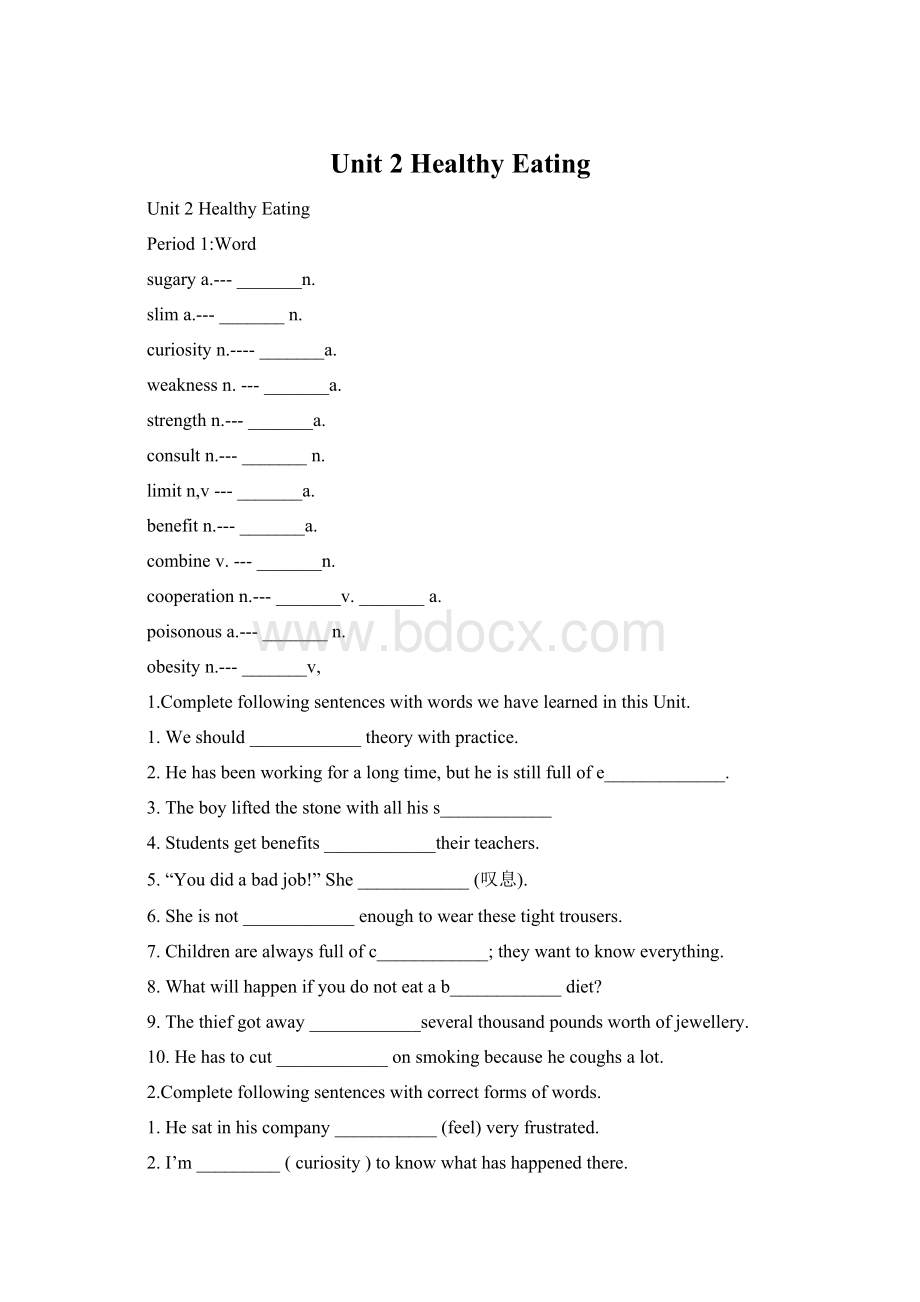Unit 2 Healthy Eating.docx
《Unit 2 Healthy Eating.docx》由会员分享,可在线阅读,更多相关《Unit 2 Healthy Eating.docx(14页珍藏版)》请在冰豆网上搜索。

Unit2HealthyEating
Unit2HealthyEating
Period1:
Word
sugarya.---_______n.
slima.---_______n.
curiosityn.----_______a.
weaknessn.---_______a.
strengthn.---_______a.
consultn.---_______n.
limitn,v---_______a.
benefitn.---_______a.
combinev.---_______n.
cooperationn.---_______v._______a.
poisonousa.---_______n.
obesityn.---_______v,
1.CompletefollowingsentenceswithwordswehavelearnedinthisUnit.
1.Weshould____________theorywithpractice.
2.Hehasbeenworkingforalongtime,butheisstillfullofe_____________.
3.Theboyliftedthestonewithallhiss____________
4.Studentsgetbenefits____________theirteachers.
5.“Youdidabadjob!
”She____________(叹息).
6.Sheisnot____________enoughtowearthesetighttrousers.
7.Childrenarealwaysfullofc____________;theywanttoknoweverything.
8.Whatwillhappenifyoudonoteatab____________diet?
9.Thethiefgotaway____________severalthousandpoundsworthofjewellery.
10.Hehastocut____________onsmokingbecausehecoughsalot.
2.Completefollowingsentenceswithcorrectformsofwords.
1.Hesatinhiscompany___________(feel)veryfrustrated.
2.I’m_________(curiosity)toknowwhathashappenedthere.
3.Ihaven’tthe__________(strong)toliftthisstone.
4.Myabilityis____________(limit).
5.Earlytobedandearlytorisemakesamanlive___________(health).
6.Thefoodiseasyto______________(digestion).
7.Exerciseis____________(benefit)toourhealth.
8.Youshouldn’teattoomuch__________(sugar)food.
9.Withthehelpofthedoctor,herecoveredfromher____________(weak).
10.Thedishtasted___________(salt)withtoomuchsalt.
LanguagePoints
1.Everybodyhastoeat,butdoyoueatahealthydiet?
diet和food都有“食物”的意思。
但diet指的是习惯的食物或规定的食物,
特指维持健康的食物,如病人的疗养食物。
food是一般指凡能吃能喝的具有营养的东西,
是不可数名词;但表示种类时是可数名词。
Exercise:
Fillintheblanks:
Thedoctorhasorderedmeaspecialdiet.Toomanysweetfoodswillmakeyoufat.Thedoctorputhimona_____tokeepthinner.Wehave_____tolive,butnotlivetoeat.Thepatientmustn’’tgowithout_____,butsheshouldhavea_____withoutsugar.
Period2:
Reading
1.FastReading
1)Readthetextandwritedownthemainideaofit.(P17,ExerciseBook)
2)Givethegeneralideaofeachparagraph.
Para1:
Para2:
Para3:
CarefulReading:
3)Makeacomparisonandfinddifferencesbetweentworestaurants.
WangPeng’srestaurant
YongHui’srestaurant
food
drink
price
Strenghtofdiet
Weaknessofdiet
CarefulReading:
TrueorFalse.
1.UsuallyWangPeng’srestaurantwasfullofPeople.
2.Heprovidedabalanceddietinhismenu.
3.YongHuiservedabalanceddiet.
4.YongHuicouldmakepeoplethinintwoweeksbygivingthemagooddiet.
5.WangPeng’scustomersoftenbecamefataftereatinginhisrestaurant.
6.YongHui’smenugavecustomersmoreenergy-givingfood.
7.WangPeng’smenugavecustomersmoreprotectivefood.
8.WangPengadmiredYongHui’srestaurantwhenhesawthemenu.
9.WangPengdecidedtocopyYongHui’smenu.
Period3LanguagePoints
1.WangPengsatinhisemptyrestaurantfeelingveryfrustrated.
frustrateda.意为“失望的,失意的”
Translation:
他感到既失意又恼火。
frustratev.使挫败,使不成功
Thebadweatherfrustratesourhopesofhavingapicnic.
N.frustration失望,沮丧
2.Usuallyhegotupearlyandpreparedhismenuofbarbecuedmutton……
prepare:
vt./vi.
preparesth.准备
prepareforsth为……准备
preparesb.forsth为某人作准备
preparesb.todo…
1)Willyouhelpme_____theparty?
A.PrepareB.preparefor
C.preparingforD.preparedfor
2)Heis____themtogoonaholiday.
A.preparedB.preparedfor
C.preparingD.preparingfor
3)He____himselffordefeat.
A.preparedB.preparedfor
C.makepreparationD.prepareto
4)What’sthatterriblenoise?
Theneighbors____foraparty.
A.havepreparedB.arepreparing
C.havepreparedD.willprepare
3.“Nothingcouldhavebeenbetter.”hethought.=Allhisfoodscouldhavebeenbest.
此句是用比较级的形式表示最高级含义。
--Howareyougettingon?
(你怎么样?
)
--Nothingcouldbebetter.(再好不过了)=Everythingisbest.
Paraphrasefollowingsentences:
1.Nobodylovedmoneybetterthanhe.
2.Ithinknothingismorepleasantthantraveling.
4.CuriositydroveWangPenginside.
1)drive:
vt.驱赶(动物),驱使……
Weatlastdrovetheenemyoutofourcountry.
Drivesb/sthoutof.....(将某人、某物逐出某地...)
Theterriblenoisedrovememad/crazy.
2)curiosity作名词,意为“好奇心”。
e.g.Hiscuriositymadehimsucceed.
常用短语:
in/withcuriosity好奇地;
outofcuriosity出于好奇。
Translation:
汤姆好奇地盯着我。
curiosity做不可数名词时,意为“珍奇的东西(事物);珍品”。
acuriosityshop古玩店
shewasinterestedincuriosities.
[拓展]curiosity的形容词形式是curious.
becuriousabout…对……感到好奇
becurioustodo极想做……
Translation:
孩子们对周围的每件事都感到好奇。
我极想知道他说了些什么。
5.WangPengwasamazedatthisandespeciallyattheprices.
amazev.吃惊,使吃惊
Itamazedmetohearthatyouwereleaving.
beamazedat….对……感到惊讶,惊愕
Youwouldbeamazedathowdifficultitwas.
[拓展]与amaze相关的短语
beamazedat/by…对……感到吃惊
beamazedtosee看到……感到吃惊
beamazedtohear听到……感到吃惊
beamazedtofind发现……感到吃惊
[辨析]especially,particularly,specially
especiallyadv.格外地;主要地;尤其,用于强调某种特别的感受,常用在介词或连词前。
Thesighthereisverybeautiful,especiallywhenthereisfog.
particularlyadv.尤其;格外地,通常以不寻常的方式突出某一事物的个性或独特之处。
它可以与especially通用,但更强调“与众不同”。
Thishandbookisparticularlyusefulformiddleschoolstudents.
speciallyadv.专门;特别地
Theseshoeswerespeciallymadeforyou.
6.Itcostmorethanagoodmealinhisownrestaurant.
cost表示某物值……
sthcost…花费……
spend指人花费...sbspendsthon/indoingsth
take指某物/人花费或需要多少时间,
ittakessb/sthtodo…
pay付款买……payfor
Exercise:
Finishfollowingsentenceswithcorrectformsof“cost,spend,take,pay”
Howmuchdoesit____?
She_____alotofmoneyonbooks.
It_____her20minutestogotoschool.
=she______20minutestogotoschool.
7.Hecouldn’thaveYonghuigettingawaywithtellingpeoplelies.
1)getawaywithdoingsth.(informal):
notbepunishedforsth.不因某事受惩罚
e.gIwon’thaveyougettingawaywithcheatingintheexam.
getawaywithsth.:
stealsth.andescapewithit偷携某物潜逃
e.g:
Therobbersrobbedthebankandgotawaywithalotofmoney.
2)lie:
作名词,意为“谎话;谎言”。
Tomoftentellslies.
lie作及物动词,还可意为“躺;位于”,其过去式是lay,过去分词是lain,现在分词是lying。
Hehasbeenlyinginbedallday.
Helaytherefortwohours.
Myschoolliesinthecentreofthecity.
lay作及物动词,意为“放置;产卵;下蛋”,其过去式、过去分词是laid,现在分词是laying。
Youcanlaythestrawagainstthewall.
8.Thecompetitionbetweenthetworestaurantswason!
beon“表示(事情)正在或将要发生”。
e.g:
There’sanewfilmonatthecinema.
9.Wanttofeelfitandenergetic?
feel在这里用做系动词,fit为表语,构成系表结构。
1)feel+adj摸起来有……感觉
Thewaterfeelscold.
2)feel+宾语+不定式(省to)/现在分词
Hefeelshishealthimprove/improving.
3)feel+(it)+宾补+不定式(真正宾语)
Shefeelsitnecessarytotellthemthenews.
Period3Grammar
1.must,can’t
1)must表示必须、必要,回答must引出的问句时,如果是否定的回答,要用needn’t或don’thaveto。
—Mustwehandinourexercisebookstoday?
—Yes,youmust.(No,youdon’thaveto.)
2)can’t在口语中代替mustn’t时,表示禁止或不准。
Youcan’tplayfootballinthestreet.
2.can,could
1)can/could表示推测时,只能用在否定句或疑问句中。
It’ssolate.CanTombereading?
Itcan’tbeMary.Shehasfallenill.
2)can/couldhavedone对过去发生行为的可能性进行推测:
Isawhimjustnowsohecouldn’thavegoneabroad.
Thedoorwaslocked.Shecouldn’thavebeenathome.
3)can/couldhavedone“本可以,本来可能已经”用于肯定句中,表示对过去发生的事情做出的判断。
Youcouldhavehadabettermark.
3.may/might
1)may/might表示推测时,只能用于陈述句,表示对现在或将来要发生的动作把握不大。
Theymaycomeheretomorrow.
2)might/mayhavedone,表示对过去发生的动作进行可能性推测。
Hemighthavereadaboutthenewsinthenewspaper.
4.shall,should
1)在一、三人称的疑问句中,shall用来询问对方的意愿。
如:
Shallwebeginourlesson?
Whenshallhebeabletoleavethehospital?
2)用于二、三人称的陈述句中,表说话人命令、警告、允诺等口吻。
如:
HeshallhavethebookwhenIfinishreading.
YoushalldoasIsay.
3)should表示劝告、建议、命令,其同义词是oughtto;在疑问句中,通常用
should代替oughtto。
如:
Youshouldgotoclassrightaway.
4)should/oughttohavedone过去应该做的事情而没有做,表责备。
如:
—Youshouldhavewrittenwithapen,notapencil.
—Yes,IknowIoughttohave,butIhadnopentowritewith.
I’mnotfeelingwellinthestomach,
Ishouldn’thaveeatensomuchfriedchickenjustnow.
5)needn’thavedone过去本不必做的事情实际上却做了。
如:
Youneedn’thavetoldhimthat.
Period4UsingLanguage
1.PleasemakeajudgmentthatwhetherfollowingstatementsareTrueorFalse:
1.WangPengcanearnhislivingnow,buthewillbeindebt.
2.YonghuithoughtWangPengspiedonhermenu.
3.Yonghuididn’tlikethefoodinWangPeng’srestaurant.
4.WangPengwouldmisshisdumplingsandfattyporkevenifinhisownrestaurant.
2.Readthepassageandanswerfollowingquestions.
1.HowdidYongHuifeelwhenshecametoWang’srestaurant?
Why?
2.Whatdidtheyfindaftertheirchat?
3.Howdidtheysolvetheirproblemsandbecomegoodfriends?
4.Howdidtheycombinetheirmenuandprovideabalancedmenu?
5.Whywastheircooperationasuccess?
3.LanguagePoints:
1.Perhapshewouldbeabletoearnhislivingafterallandnothavetoclosehisrestaurant.
earnone’slivingby...=liveby...=makealivingby...
Heearnedhislivingbybeggingfromdoortodoor.
表示“谋生”的短语:
earnalivingearnone’slivingmakealivingmakeone’sliving
earnvt.挣得;赢得
Hissuccessearnedhimaprize.
Heearnedfamebyhelpingthestudents.
Heandhiswifeeach____10yuananhour.
earnsB.earnC.spendsD.takes
2)afterall意为“终究;结果”,表示结果与预想不同,通常置于句尾,也可以表示“毕竟”,引出原因,通常置于句首。
Ithasturnedouttobeanicedayafterall.
【拓展】afterall作介词,表示“虽然”。
Afterallhisefforts,healsofailedthistime.
虽然他很努